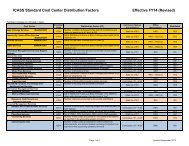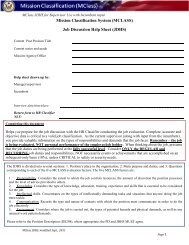Local Employment Policy Handbook - ICASS
Local Employment Policy Handbook - ICASS
Local Employment Policy Handbook - ICASS
You also want an ePaper? Increase the reach of your titles
YUMPU automatically turns print PDFs into web optimized ePapers that Google loves.
CATEGORIES OF PERSONNEL AND THE EMPLOYMENT MECHANISM<br />
For official definitions of these categories of personnel, see 3 FAM 7120.<br />
1. US Citizen Eligible Family Member (USEFM) who is also an Appointment Eligible Family Member<br />
(AEFM):<br />
A. For State: HR uses a Family Member Appointment or Temporary Appointment for a US<br />
Citizen EFM who is also an Appointment Eligible Family Member.<br />
B. For Participating Agencies: HR uses a PSA to employ a US Citizen EFM, unless the<br />
participating agency tells HR otherwise.<br />
2. Eligible Family Member: See 14 FAM 511.3. These are individuals who do not meet the definition of<br />
Appointment Eligible Family Member (AEFM), including EFMs who aren’t US Citizens. For State and<br />
participating agencies, HR employs EFMs who don’t meet the definition of AEFM under a PSA.<br />
A. Non-US Citizen EFMs must have a US Social Security Number before employment as a NOR<br />
with compensation from an American pay plan.<br />
B. HR must employ a non-US Citizen EFM who is a citizen of the host country (country of<br />
assignment of the Foreign, Civil, or uniformed service member) as OR with compensation from<br />
the LCP.<br />
3. EFM Receiving a USG Foreign or Civil Service Annuity: HR employs an EFM receiving a USG<br />
Foreign or Civil Service pension or annuity under a PSA.<br />
4. Member of Household: An individual residing at post with a direct hire Foreign, Civil, or uniformed<br />
service member permanently assigned to the Mission and under Chief of Mission authority, or at an office<br />
of the American Institute in Taiwan. The sponsoring employee must officially declare the MOH to the<br />
Chief of Mission as part of his/her household. The MOH is not an EFM and not on the travel orders of<br />
the sponsoring employee. MOHs must be legally eligible to work in country, which often means having a<br />
work permit, residency permit, or both the work and residency permits. MOHs do not have to be US<br />
Citizens. For employment purposes, MOHs are Ordinarily Resident in most countries and compensated<br />
under the <strong>Local</strong> Compensation Plan.<br />
HR employs MOHs under a PSA for State and participating agencies that have signed the MOA to use<br />
State’s PSA authority.


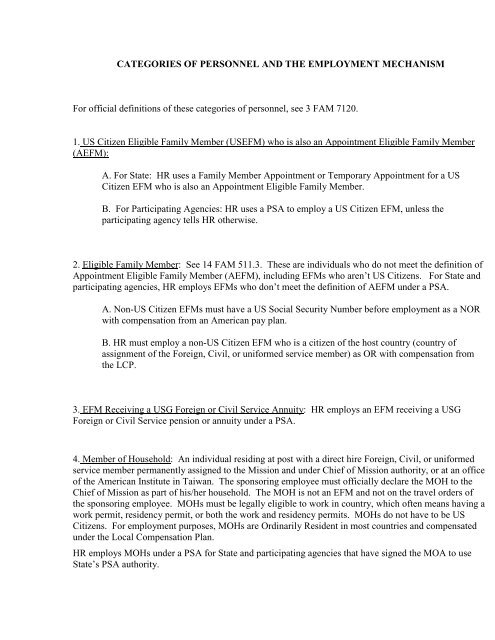
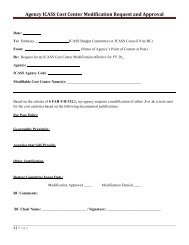
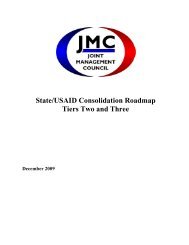
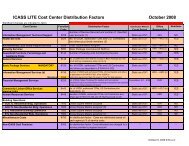
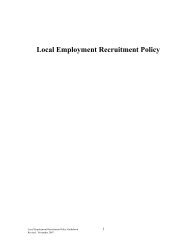
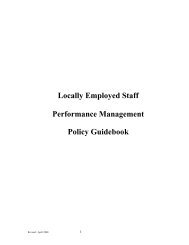
![Appendix D Reviewer Requirements Checklist GDB 2[1]. - ICASS](https://img.yumpu.com/37563692/1/190x245/appendix-d-reviewer-requirements-checklist-gdb-21-icass.jpg?quality=85)
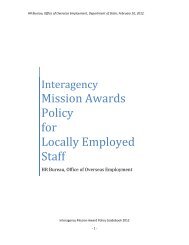
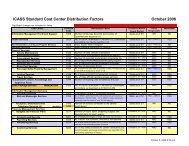
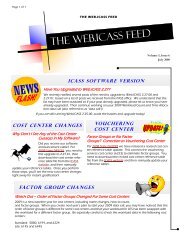
![GPAT for Web[1].ICASS GDB r2.31.00](https://img.yumpu.com/37563643/1/190x245/gpat-for-web1icass-gdb-r23100.jpg?quality=85)

